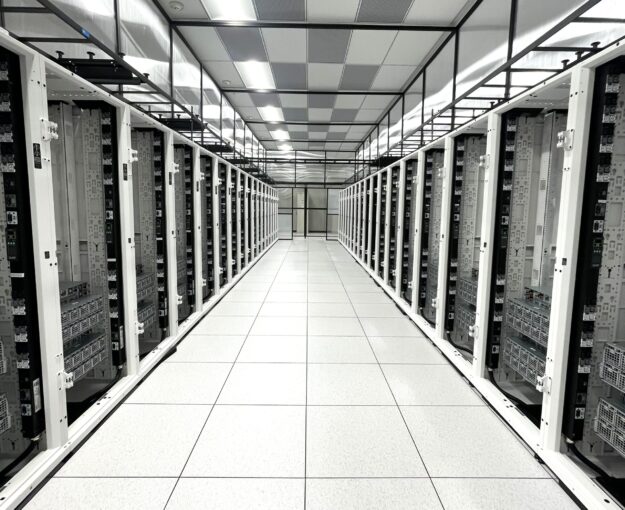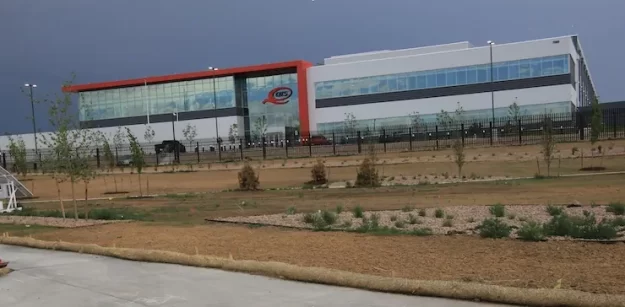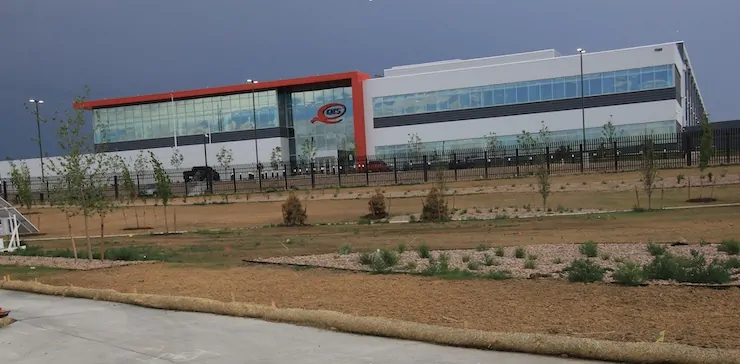Widgetized Section
Go to Admin » Appearance » Widgets » and move Gabfire Widget: Social into that MastheadOverlay zone
Analysis: Colorado data center bill raises serious questions of electric consumers subsidizing Big Tech

A new data center in Raleigh, North Carolina (photo courtesy of Vijay Gadepally).

Colorado has a new data center in Aurora, near I-70 and E-470, that by almost any calculation falls under the heading of “mega.” There is considerable evidence of others planned on land near DIA and perhaps elsewhere (photo/Allen Best).
Colorado’s electrical utilities and supporters cried foul a few weeks ago about a bill being prepared for introduction in the final weeks of this legislative session.
The bill would have required them to get to 100% renewable generation by 2040 provided it could be achieved without harm to ratepayers.
It’s too late in the session for such a sweeping mandate, well past the normal deadline for introduction of bills, said the utilities. They had not been involved in drafting such important legislation that would impact them.
(BS, said the environmental community. The utilities were indeed consulted.)
So far, the idea has not emerged into a bill.

But a different bill did emerge, and it impacts the electrical utilities in potentially powerful ways. It was awarded late bill status. Introduced on April 4 and will get its first hearing this Wednesday, April 16, in the Senate Energy and Transportation Committee.
Will the utilities again cry foul?
SB25-280, called the Data Center Development & Grid Modernization Act, would offer generous tax credits to data center developers.
The bill argues that Colorado is not getting its rightful piece of the economic pie of data centers. It currently has 2% of national data center investment and hence risks losing $3 billion to $4 billion in potential investment over the next decade “despite significant advantages in climate, workforce, and renewable and clean resources.”
The proposed law also notes that the Colorado Electric Transmission Authority has identified $4.5 billion of infrastructure investment through 2045, “with significant requirements for grid modernization, reliability enhancement, and renewable and clean energy integration.”
Data centers created with these incentives, says the bill, will provide a transformative opportunity.
The bill runs for 47 pages – quite a lot to digest. There is far more than is summarized here.
Rep. Nick Hinrichsen of Pueblo and two other Democrats and one Republican are prime sponsors for the bill. It would create a new program within the Colorado Office of Economic Development.
The bill also proposes an array of state sales and use taxes and income tax credits for data center developers. It would make data center projects of at least $250 million investment eligible for 100% sales and use tax exemptions on the purchase, use, and storage of information technology, infrastructure, data center infrastructure, and electric grid enhancement equipment for 20 years.
To qualify, the project must meet energy efficiency standards, implement water stewardship strategies, and source at least 50% of the data center’s energy from renewable and clean sources.
There’s a second tier of tax breaks eligible for operators who invest at least $10 million in grid enhancement and modernization or other good deeds specified by the bill. This would make them eligible for an income tax credit of 10% of the cost.
A bonus 5% income tax credit would be awarded if such investment is made in rural areas.
Will this bone draw data centers developers to places like Craig and Nucla, which really could benefit from having the tax base of a data center? Or, for that matter, Alamosa, Burlington or Trinidad?
Why do data center developers need these tax credits? Colorado already has relatively inexpensive electricity.
That’s one question that should be asked.
Another crucial question is whether this sort of economic development will go to places in Colorado that badly, almost desperately need the property tax base that data centers can deliver. Or will the incentives just produce more data centers where they already exist, almost entirely along the Front Range from Colorado Springs to Loveland?
More questions yet are posed in a letter of April 10 signed by a variety of environmental groups operating in Colorado, few of them household names, which take sharp objection to the bill. Among the better-known groups is the Boulder-based Southwest Energy Efficiency Project.
“We are not opposed to data centers in general,” said Justin Brandt, the utility program director. “We just want to make sure that we are not giving them unnecessary incentives and that they come up with appropriate environmental safeguards and consumer protections.”
He called it a “really sweeping bill in terms of incredibly generous tax credits” and said “almost no” stakeholder input has been solicited.
Brandt also expressed reservations about the proposal to allow data centers to bypass a review by the state’s Public Utilities Commission before getting a certificate of public necessity when installing new generating capacity.
Critics also say the tax breaks will be unnecessary.
“The primary companies behind data center development are large tech companies such as Amazon, Google, Meta and Microsoft,” says the letter signed by 30 groups and individuals, among them the Sierra Club, Conservation Colorado, and 350 Colorado.
“These companies have billions of dollars in revenue and profits every year. This bill would provide those companies with massive tax credits. Over the 20-year period of the tax incentives established by this bill, a data center may need to replace all of the servers within a data center four or five times, in addition to the initial build-out of the facility. None of these investments would be subject to the state’s sales and use tax, cheating the state out of potentially substantial revenue.”
The letter also says the bill threatens Colorado’s ability to meet its climate goals. The bill does say that at least 50% of new energy for data centers come from renewable and clean energy sources. This does not, the letter points out, help Colorado meets its decarbonization goals.
Also a major issue is whether tax breaks for data centers will result in their electricity being subsidized by other ratepayers.
Colorado already authorizes data center operators to receive lower electric rates. These “economic development rates” were approved in a 2018 bill.
Will these tax breaks, in effect, result in socialized costs for data center developers and operators.?
A study from the Environmental & Energy Law Program at Harvard Law School suggests skepticism should be in order when utilities claim that data center energy costs are isolated from the bills of other consumers.
“The very same rate structures that have socialized the costs of reliable power delivery are now forcing the public to pay for infrastructure designed to supply a handful of exceedingly wealthy corporations,” wrote Eliza Martin and Ari Peskoe in their study, “Extracting Profits from the Public: How Utility Ratepayers are Paying for Big Tech’s Power.”
Xcel Energy, in the just transition electric resource plan that it filed with the Colorado Public Utilities Commission in October, 2024, said it expected a giant increase in electrical demand in the next several years, five to six times the rate of growth of the last few years. Of that growth, 72% of new peak demand will come from data centers.
In its filing, the utility also said that it had ceased to offer economic development rates to induce data centers.
Exactly what problem does this bill intend to solve? A case can be made that Pueblo, home base for the prime sponsor, needs the tax base of data centers as it prepares for life after coal. But will it? Pueblo is served by Black Hills Energy, which has among the highest electric rates in the state.
Will this solve that?
And the final question should be directed to Gov. Jared Polis. Most assuredly this bill would not be moving forward without at least his tacit approval. And maybe it has his encouragement. It’s hard to say.
So, why is that?
Editor’s note: Allen Best is a Colorado-based journalist and former Vail-area resident who publishes an e-magazine called Big Pivots. Reach him at allen.best@comcast.net.
Latest posts by Allen Best, Big Pivots (see all)
- Analysis: Colorado data center bill raises serious questions of electric consumers subsidizing Big Tech - April 15, 2025
- Hurd, Evans walking fine line on renewable energy as Trump pushes ‘drill, baby, drill’ oil, gas agenda - March 21, 2025
- Big Pivots: Holy Cross Energy takes another step toward 100% renewable energy - December 17, 2024


